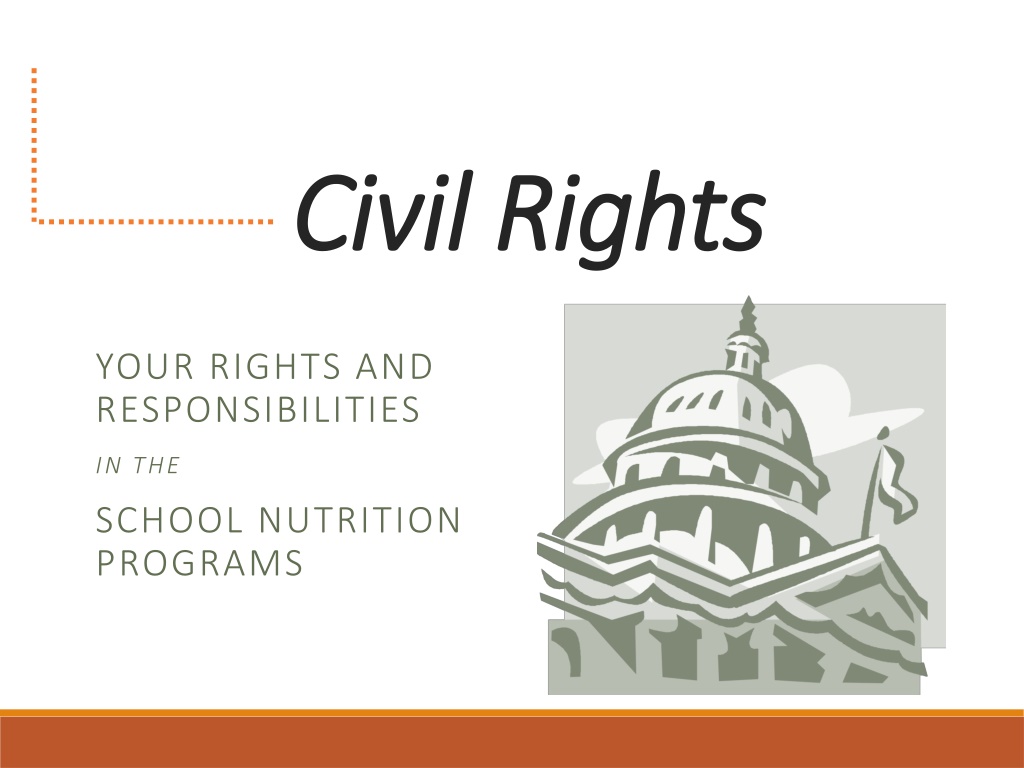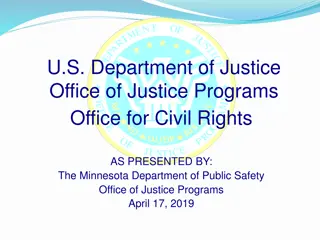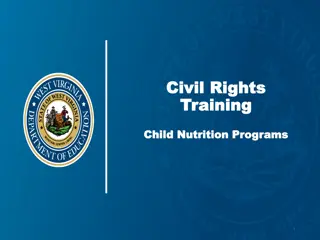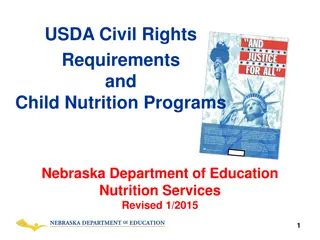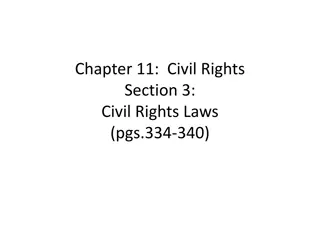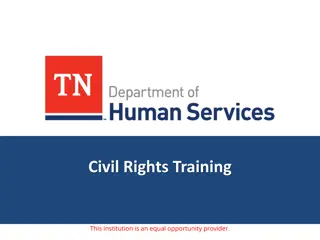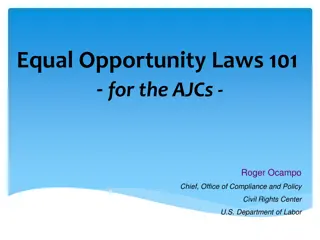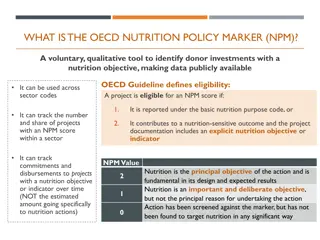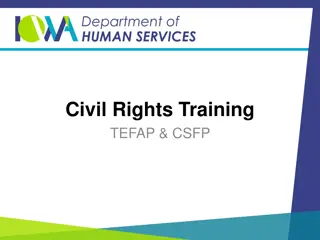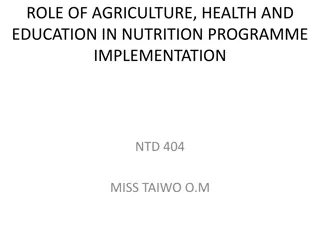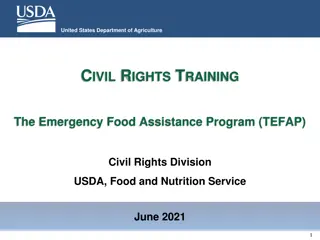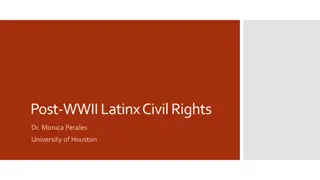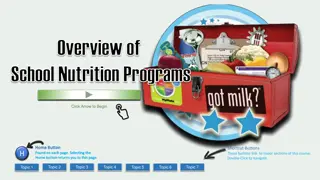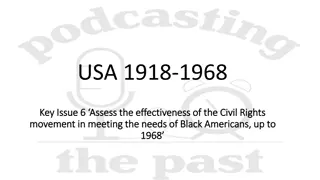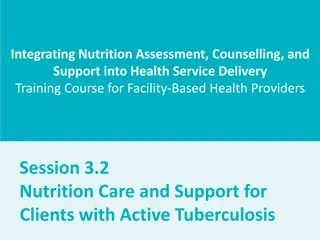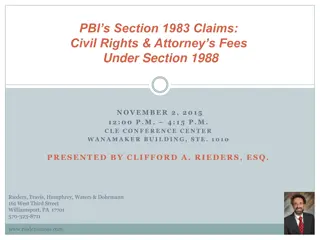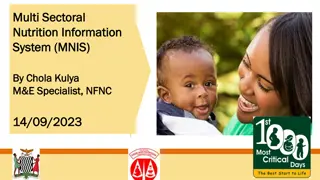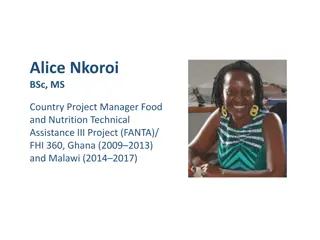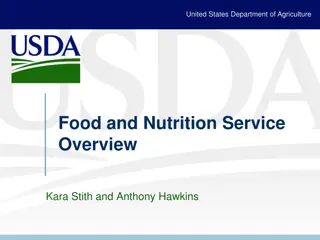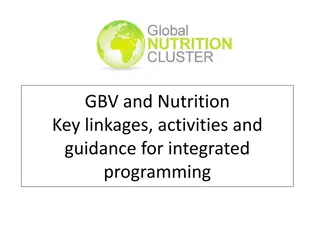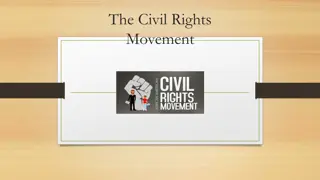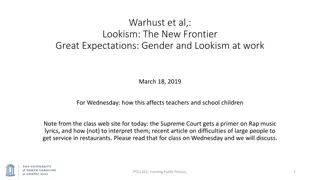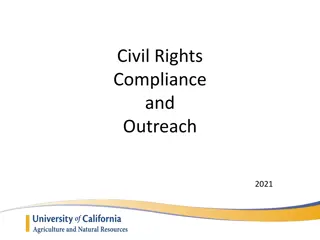Understanding Civil Rights in School Nutrition Programs
This content provides information on civil rights in school nutrition programs, including the rights and responsibilities of staff and participants, annual training requirements, goals to eliminate barriers, definitions of civil rights terms, how to identify discriminatory actions, protected classes, and relevant legislation such as the Civil Rights Act of 1964. It emphasizes the importance of equal treatment and respect for all individuals involved in federally funded programs.
Uploaded on Oct 03, 2024 | 0 Views
Download Presentation

Please find below an Image/Link to download the presentation.
The content on the website is provided AS IS for your information and personal use only. It may not be sold, licensed, or shared on other websites without obtaining consent from the author. Download presentation by click this link. If you encounter any issues during the download, it is possible that the publisher has removed the file from their server.
E N D
Presentation Transcript
Civil Rights Civil Rights YOUR RIGHTS AND RESPONSIBILITIES IN THE SCHOOL NUTRITION PROGRAMS
Annual Training Annual Training The USDA requires that all frontline staff who work with program applicants or participants are required to receive annual Civil Rights training as well as those who supervise frontline staff. Training is required so that people involved in all levels of program administration understand Civil Rights related laws, procedures Clerks Anyone that approves or handles applications Lunchroom/kitchen workers Staff that take lunch counts Attendance Roster and directives.
Goals Goals To eliminate barriers eliminate barriers that prevent or deter people from receiving benefits of a government sponsored/funded program. To provide equal treatment equal treatment in the delivery of programs and services to all applicants, participants and beneficiaries of a federal program. To ensure that all applicants and participants understand participants understand their rights and responsibilities. all applicants and To show respect and dignity respect and dignity to all.
Definitions Definitions Civil Rights: Civil rights refers to the rights of personal liberty or fair and equitable treatment of all customers and employees as guaranteed by the U.S. Constitution and Acts of Congress. Discrimination: Occurs when the civil rights of an individual are interfered with because of their membership in a particular group or class.
The 4 Ds The 4 D s How do you decide if an action is discriminatory? 1. Denied benefits or services that others received? 2. Delayed in receiving benefits or services that others received? 3. Treated Differently than others, to their disadvantage? 4. Given Disparate treatment, that is, something that does not seem discriminatory, but has a discriminatory nature in practice?
Protected Classes Protected Classes What is a protected class? Protected classes in School Nutrition Programs: A protected class is any person or group of people who have characteristics for which discrimination is prohibited based on a law, regulation or executive order. Race Color National Origin Sex Age Disability
Legislation Legislation Civil Rights Act of Civil Rights Act of 1964 Non-discrimination on the basis of race, color, or national origin. Title VI: Prevents discrimination in federally funded programs. Title VII: Prevents employment discrimination where the employer is involved in interstate commerce. Title IX: Non-discrimination on the basis of sex. 1964 The Americans with Disabilities Act of 1990 The Americans with Disabilities Act of 1990 Non-discrimination on the basis of disability. Age Discrimination in Employment Act Age Discrimination in Employment Act Non-discrimination on the basis of age.
Sponsor Responsibilities Sponsor Responsibilities Sponsor Responsibilities: Racial/ethnic data collection Public notification systems Complaint procedures Resolution of Noncompliance Equal access plan Reasonable accommodation requirements Language assistance requirements Conflict resolution plan Compliance Review Techniques Customer Service School Nutrition Programs sponsors are responsible for ensuring that the civil rights of all applicants and participants are protected.
Racial & Ethnic Data Racial & Ethnic Data Schools are required to have a system to collect racial and ethnic data of its program participants. The data is used to determine the state s compliance with federal Civil Rights laws. Applicants who are completing the Free and Reduced-Price School Meals Application have the option to identify their children s racial and ethnic identities.
Public Notification Public Notification Schools must notify the public of their participation in School Nutrition Programs. Notification must include: Program availability 1. Complaint procedures 2. Nondiscrimination statement 3.
Public Notification (continued) Public Notification (continued) 1. Prominent display of the And Justice for All Poster 2. Public release to the media 3. Provide alternative information formats for disabled persons 4. Use the non discrimination statement on publications and websites 5. Convey equal opportunity in photographs 6. Notify households and students with disabilities of the process for requesting a dietary or non-dietary accommodation related to his or her meal service.
Public Notification (continued 2) Public Notification (continued 2) Double-check School s website home page! All informational materials, including websites used to inform the public about the School Nutrition Programs must contain a Nondiscrimination Statement Must be posted on home page of school s website
Equal Access Equal Access Schools must administer programs so that they are accessible to all participants regardless of race, color, national race, color, national origin, sex, age, or origin, sex, age, or disability. disability.
Equal Access (continued) Equal Access (continued) Disability: References: Any person who has a physical or mental impairment which substantially limits one or more major life activities, has a record of such an impairment, or is regarded as having such an impairment. USDA Special Needs Guidance Accommodating Children with Life Threatening Food Allergies The Food Allergy Book
Reasonable Accommodation Reasonable Accommodation Food Substitutions and Modifications Schools must make reasonable accommodations for students with disabilities. A School Nutrition Program is required to provide food substitutions or modifications if: A physician s statement is on file that describes the participant s disability; and The physician has indicated the substitutions or modifications that the participant needs. It is required for sponsors to notify households and students with disabilities of the process for requesting a dietary accommodation. Medical Statement for Children with Disabilities Schools can choose to provide accommodations for students who are not disabled. Milk Substitution List
Meaningful Access Meaningful Access Language Assistance Schools must accommodate people with limited English proficiency in the language they can read, write and understand. Using children interpreters under the age of 18 is prohibited. See MAPS Home page for information on accessing free translation/interpretation services or reach out to Montana OPI at 406-444- 2501. Free and Reduced-Price School Meal Applications may be found in 26 languages at the USDA/FNS Web site: http://www.fns.usda.gov/cnd/FRP/frp.process.htm. And Justice for All poster available in other languages https://www.fns.usda.gov/cr/and-justice-all-posters-guidance-and- translations
Complaints Complaints Everyone has the right to file a civil rights complaint. All staff and volunteers need to know what to do if someone wants to file a complaint. Be aware of the basis for which complaints may be filed: race, color, national origin, age, sex, and disability. Never discourage anyone from filing a complaint or voicing concerns of discrimination.
Complaint Procedure Complaint Procedure Dealing with complaints (people have 180 days to file a complaint) Listen politely Take corrective action Get required information as listed on complaint form Refer the person to the contact information on the And Justice For All poster Report the problem to School Nutrition Programs Follow up in a timely manner
Complaint Procedure (continued) Complaint Procedure (continued) To make a complaint, the following information must be obtained and reported to School Nutrition Programs: All Civil Rights complaints, verbal or written, must be promptly submitted to: Complainant Name of person taking complaint Cause of complaint including protected class that the complainant feels was discriminated against Dates and locations that discriminatory action(s) occurred, and possible witnesses (other than complainant) OPI School Nutrition Programs PO Box 202501, Helena, MT 59620-2501 Telephone: (406) 444-2501, Fax: (406) 444-2955 Civil Rights Complaint Form
Compliance Review Techniques Compliance Review Techniques State and Federal governments are required to conduct reviews to determine compliance with civil rights laws, regulations, and requirements There are a variety of reviews that are part of the regular monitoring for USDA Programs Cooperation with State and Federal reviewers is required as a condition of receiving Federal financial assistance
Resolution of Noncompliance Resolution of Noncompliance Corrective Actions may be assigned as a result of the review process. Agencies/Sponsors are required to cease inappropriate actions and institute appropriate procedures. Failure to comply can result in the loss of financial assistance from all Federal sources.
Conflict Resolution Conflict Resolution Develop a written and posted policy for dealing with unacceptable behavior and conflicts Try to remain calm Listen to participant s concerns Try to explain the situation Get help, especially with threats or violence. Use alternative dispute resolution (ADR) techniques
Customer Service Customer Service Treat everyone with dignity and respect and make people feel welcomed. Make sure that participants receive equal treatment and service. Do not do special favors for anyone that you are not prepared to provide for everyone. Stay positive. Explain policies and rules. Do not treat people differently based on race, color, national origin, age, sex, or disability. Do not impose policies that unfairly impact certain groups. Do not retaliate against anyone who files a civil rights complaint.
Resources Resources School Nutrition Programs School Nutrition Programs (406) 444-2501 https://opi.mt.gov/Leadership/Management-Operations/School-Nutrition Click on Administration, Civil Rights: Accommodating Children with Special Dietary Needs in the School Nutrition Programs Complaint Form Civil Rights and Equal Employment Opportunity (USDA) Civil Rights and Equal Employment Opportunity (USDA) www.usda.gov Montana Human Rights Bureau Montana Human Rights Bureau https://erd.dli.mt.gov/human-rights/
